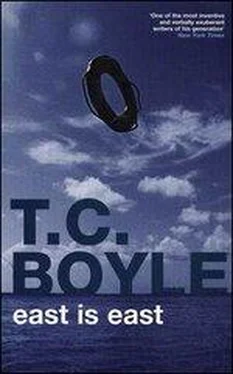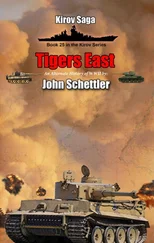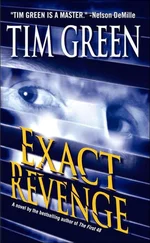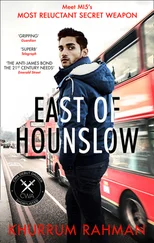Tom Boyle - East is East
Здесь есть возможность читать онлайн «Tom Boyle - East is East» весь текст электронной книги совершенно бесплатно (целиком полную версию без сокращений). В некоторых случаях можно слушать аудио, скачать через торрент в формате fb2 и присутствует краткое содержание. Жанр: Современная проза, на английском языке. Описание произведения, (предисловие) а так же отзывы посетителей доступны на портале библиотеки ЛибКат.
- Название:East is East
- Автор:
- Жанр:
- Год:неизвестен
- ISBN:нет данных
- Рейтинг книги:5 / 5. Голосов: 1
-
Избранное:Добавить в избранное
- Отзывы:
-
Ваша оценка:
- 100
- 1
- 2
- 3
- 4
- 5
East is East: краткое содержание, описание и аннотация
Предлагаем к чтению аннотацию, описание, краткое содержание или предисловие (зависит от того, что написал сам автор книги «East is East»). Если вы не нашли необходимую информацию о книге — напишите в комментариях, мы постараемся отыскать её.
, praised by
in
as "one of the most exciting young fiction writers in America," the result is a sexy, hilarious tragicomedy of thwarted expectations and mistaken identity, love, jealousy, and betrayal.
East is East — читать онлайн бесплатно полную книгу (весь текст) целиком
Ниже представлен текст книги, разбитый по страницам. Система сохранения места последней прочитанной страницы, позволяет с удобством читать онлайн бесплатно книгу «East is East», без необходимости каждый раз заново искать на чём Вы остановились. Поставьте закладку, и сможете в любой момент перейти на страницу, на которой закончили чтение.
Интервал:
Закладка:
Finally, buildings began to appear—long low wooden structures, a museum, a tourist center—and then he was pulling into a dirt lot behind a phalanx of police cars, two fire trucks and an ambulance. The lot was jammed with campers and pickups and there were people everywhere, though it was early, very early, so early it should have been the shank of the night still. People milled around the boats, peeked in the windows of the police cars, twirled binoculars round their necks, breakfasted out of picnic baskets, lifted brown paper bags to their lips. Bare-legged kids tore across the macadam, trying to lift kites into the lifeless air, an old man was watching TV in the back of a jeep and a woman with big meaty arms and breasts backed away from a battered Ford with a birdcage and set it down in the middle of the lot. It was crazy. It was like the Fourth of July or the beginning of a music festival, only worse. Abercorn felt his stomach sink.
“Lewis, you don’t think all these people—?” he began, but the idea of it, the fear of it, locked the words in his throat and he couldn’t go on. These people weren’t just happy campers and holiday makers gathered here inadvertently at 7 A.M. on a weekday morning. No. They were gathered here as they gathered at the site of any disaster, patient as vultures. They were waiting for bloodshed, violence, criminality and despair, waiting for excess and humiliation, for the formula that would unlock the tedium of their lives. “But how in Christ’s name did they know? We just found out about the Nip—I mean, the Japanese—I mean, the Nip—ourselves. Am I right?”
Turco didn’t answer, but he looked grim.
The moment Abercorn swung open the door a group of people detached themselves from the crowd and converged on him. He’d noticed them out of the corner of his eye as he maneuvered into the parking space—they were too well dressed for tourists and they seemed nervous, edgy, as if they were about to break into a trot, and what was that, a camera?—but now everything came clear: the press. They were on him before he could unfold himself from the car and there was his face, swollen ears and all, staring back at him in three angry colors from the dark eye of the TV camera.
“Mr. Abercorn!”—his name, they knew his name—“Mr. Abercorn!”
A woman with a plastic face and frozen hair had squared off in front of him like a wrestler. She looked familiar, looked like someone he’d seen on television, back in the days when he had an apartment, an office, when he was a member of society with a dull nine-to-five job like everyone else. TV, he thought, hey, I’m going to be on TV, and felt a little jolt of excitement despite himself. But then he understood that N. Carteret Bluestone was sure to see him there and he felt his stomach clench round the pool of cheap diner coffee that churned there, deep down, eating at him like battery acid.
What had begun as a little story, a six-line thing on page 28 of the Savannah Star, something to fill the odd space left over after they printed up the specials on boneless chicken and toilet paper, was now a big story, a TV story. He should have seen it coming. This was a real potboiler, after all, full of sex, violence, miscegenation, hair-raising escapes, swamps teeming with snakes and alligators, rumors of official incompetence and collusion on the part of a bunch of suspect writers and artists. Christ, it could be a soap opera, a miniseries. As the Swamp Turns. From Here to Okefenokee. Jap Hunter.
The woman with the plastic face wanted to know why it had taken the INS better than six weeks to capture this fugitive—and what about allegations of incompetence? She furrowed her brow in an investigatory frown, as if it hurt her to put such hard questions. Before Abercorn could frame an answer, a fiftyish man with a savage nose and forearms bristling with white hair poked a microphone at him and asked what the problem was with the security at the Tupelo Island prison facility—was somebody napping on the job? And if so, who?
And then the voices rose in a clamor: How did he feel about working with the local authorities? What was the suspect eating out there? Did they expect to catch him soon? Was he dangerous? What about quicksand? Snakes? Alligators? What about Ruth Dershowitz?
Abercorn found himself backed up against the car, feeling two feet taller than he already was, feeling naked and conspicuous, his face reddening like bratwurst on a rotisserie. There were too many of them and they were all jabbing at him at once. He’d never had to deal with the public before, never been asked a single question about a case, not even by telephone, not even the time the Hmong microwaved the chihuahua and the AKC compared them to Nazis at Auschwitz. His tongue thickened in his throat. He didn’t know what to say. And he might have stood there eternally, looking stupid in living color for N. Carteret Bluestone and half the rest of the world, if it hadn’t been for Turco. “No comment,” Turco snarled, slashing through the thicket of microphones with a homicidal leer and jerking him by the arm. And then they were moving, briskly, heading for the cover of the police cordon and the clutch of cleanshaven men in uniform gathered beyond it.
Abercorn recognized the man at the center of the clutch: Sheriff Bull Tibbets of the Ciceroville Police Department. If Theron Peagler had been something of a surprise—college-educated, soft-spoken, intelligible—Sheriff Tibbets was just what he’d expected. He was a grim-looking fat man with a wad of tobacco bloating his cheek, a big-brimmed trooper’s hat shoved back on his head and a pair of mirror sunglasses masking eyes that were too small and dull to be fully human. He’d given Abercorn a look of undisguised contempt at the Ciceroville station the preceding night, and now he didn’t so much as turn his head as he and Turco joined the group. There seemed to be a debate going on, but Abercorn couldn’t catch much of what they were saying—the accent was pure hell down here, sounded like they were chewing on sweatsocks or something.
“Gawl rawl, rabid rib,” the sheriff said.
The man beside him—he was like a toy compared to the sheriff and as slippery, low-browed and loose-jointed as a Snopes—pressed the point. When he spoke, he sounded as if he were in great pain.
There was a moment’s silence, and then the sheriff rolled his massive head back on his neck, exposing a spatter of angry red pustules just beneath his chin and flashing the heavens with the light reflecting off his sunglasses. “Gawl rawl,” he repeated himself, “rabid rib.”
Turco folded his arms. He looked bored, looked impatient. In the distance, yet another bird, all legs and wings, swooped across the cremated sky. “What’s the deal?” Abercorn asked.
Turco lowered his voice. “The squirrely guy wants to bring the dogs in, sheriff says no.” He gazed out over the landing, the weeds and muck and the mad growth of trees, narrowing his eyes as if he expected to spot the suspect sculling across the horizon. “Dogs are prohibited here,” he added by way of clarification. “Park regulations. Alligators go crazy for them, overturn canoes, jump right up out of the water to snatch them off the dock. It’s like catnip to a cat.”
Abercorn was dumbfounded. Alligators! Jesus. The more he learned about this place, the more he longed for Hollywood Boulevard.
They stood there another minute, listening to the sheriff and his men chew socks at one another, and then they were moving again, Turco leading, Abercorn following. “These guys are a bunch of cheesebags,” Turco pronounced, spitting the words over his shoulder. Abercorn couldn’t have agreed more, but wondered where exactly they were going and how it was going to help them capture, prosecute, imprison and deport Hiro Tanaka and get N. Carteret Bluestone off his back. And beyond that, how it was going to get him out of Crackerland and back to the mossy somnolent streets of Savannah and the attentions of girls like Ginger and Brenda who wanted only to sip juleps, eat oysters and fuck athletically on the rug in front of the air conditioner. Turco was leading him back toward the police cordon and the tourist center beyond it.
Читать дальшеИнтервал:
Закладка:
Похожие книги на «East is East»
Представляем Вашему вниманию похожие книги на «East is East» списком для выбора. Мы отобрали схожую по названию и смыслу литературу в надежде предоставить читателям больше вариантов отыскать новые, интересные, ещё непрочитанные произведения.
Обсуждение, отзывы о книге «East is East» и просто собственные мнения читателей. Оставьте ваши комментарии, напишите, что Вы думаете о произведении, его смысле или главных героях. Укажите что конкретно понравилось, а что нет, и почему Вы так считаете.











